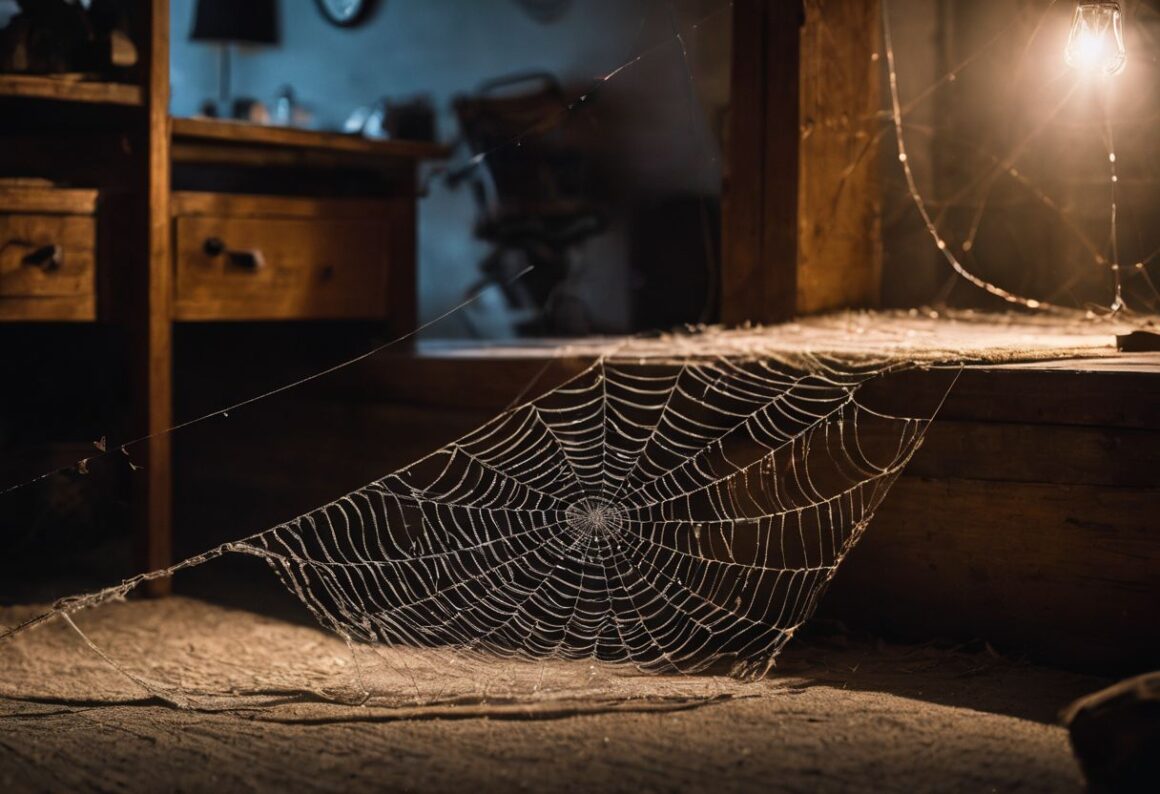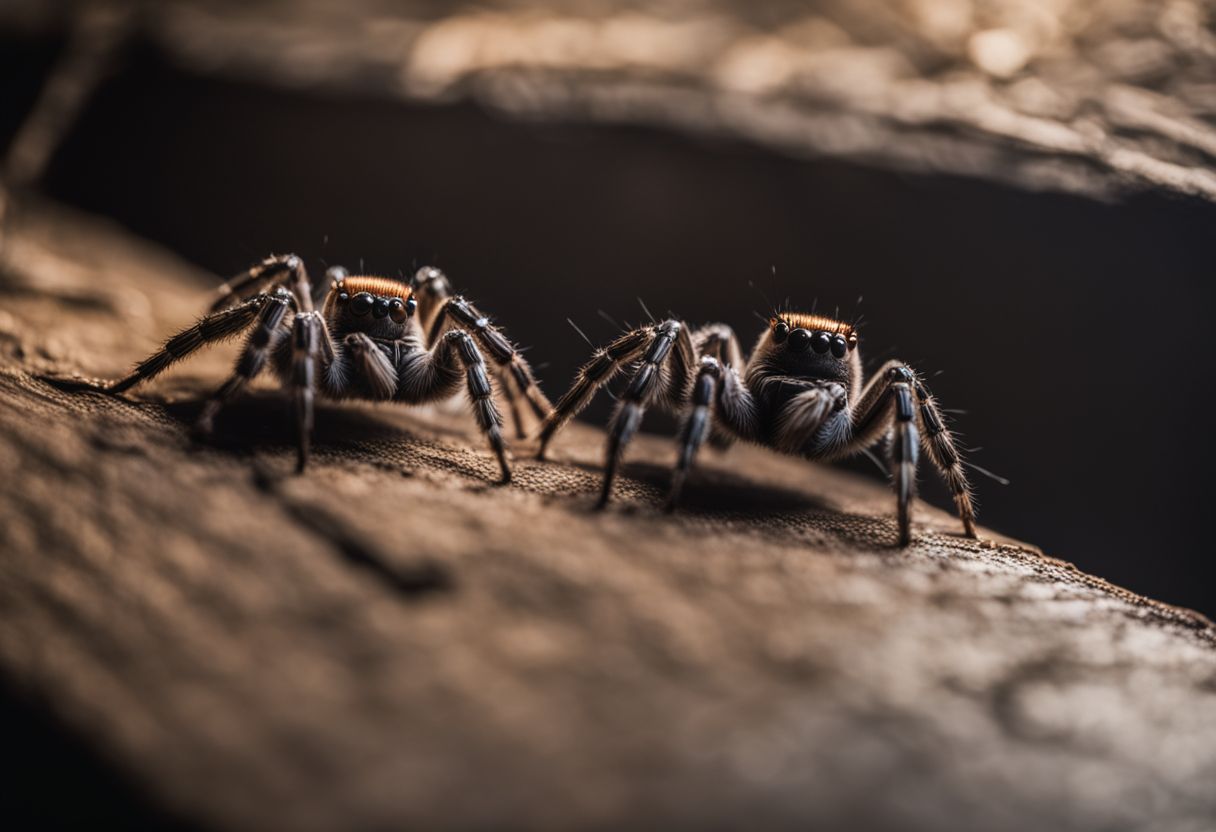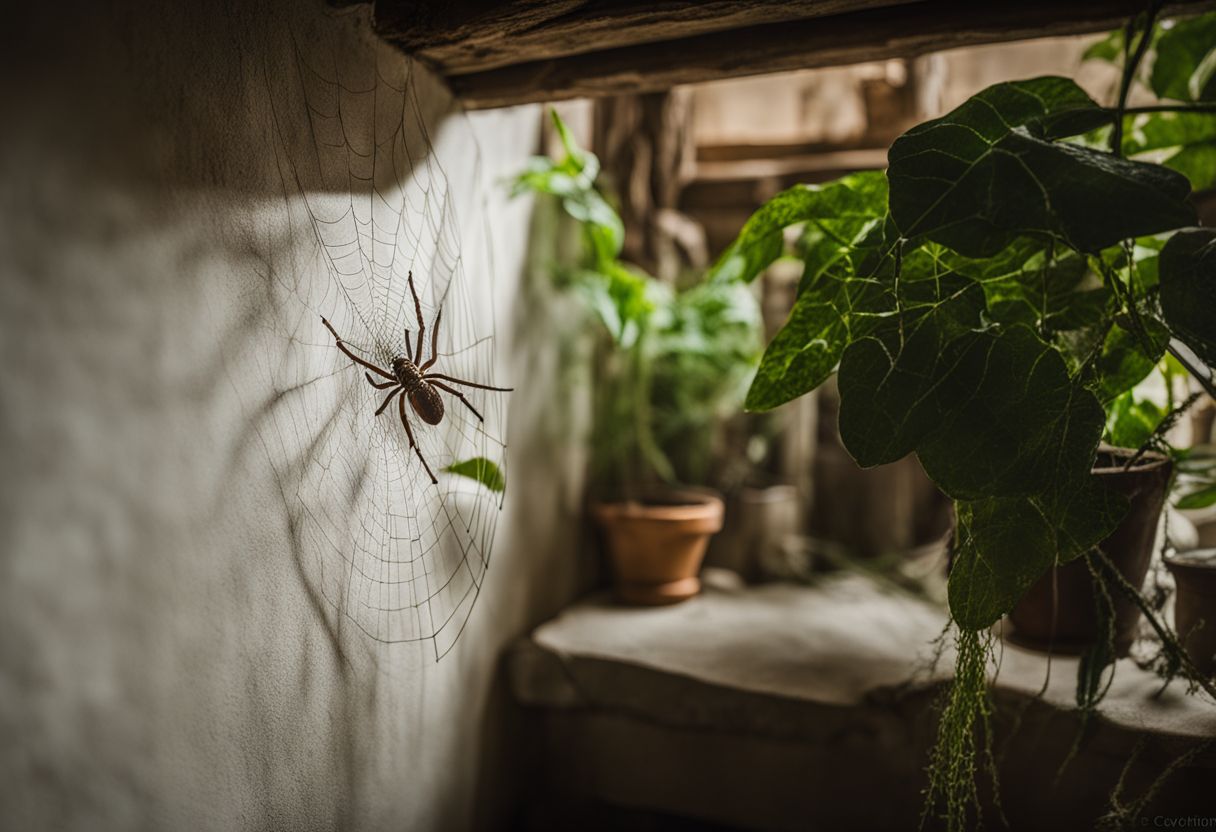Finding spiders in your basement can be an unsettling experience. These eight-legged visitors are often unwelcome house guests. Our guide provides practical and effective ways to clear them out and keep them from returning.
Let’s tackle those pesky spiders together!
Primary Lessons
- Seal cracks and openings in your basement to stop spiders from getting inside. Use caulk for small holes and weather stripping for gaps around windows and doors.
- Make a vinegar and water spray or use essential oils like peppermint, tea tree, or lavender to repel spiders naturally without chemicals.
- Keep your basement dry, organized, and clutter – free. Spiders like dark, moist places with lots of stuff where they can hide.
- Grow spider – repellent plants like basil and chrysanthemums near your home or use their oils on cotton balls to keep spiders away.
- Consider having a cat as they can scare off spiders by hunting them down.
Understanding Spiders in Basements
To tackle a spider infestation effectively, it’s crucial to grasp why these eight-legged intruders favor your basement. Let’s dive into the hidden corners of basements to uncover how spiders infiltrate this space and assess the risks they pose.
How spiders get into basements
Spiders slip into basements through tiny cracks and openings. They crawl under doors or find gaps around windows. Even small holes in your foundation can let spiders inside. Once they’re in, they look for corners or clutter to hide in.
You might see more spiders if your basement is damp since moisture attracts them. Keep the area dry to make it less inviting for an infestation. Seal up any cracks with caulk to block their way in.
Regularly check doorways and window sills for new ways spiders could get into your basement.
Common types of spiders found in basements
Several spider species prefer the dark, quiet corners of a basement. Black widows have a notorious reputation due to their venomous bite. They are easy to spot with their shiny black bodies and red hourglass marking.
Brown recluse spiders also lurk in basements and can be dangerous. They are brown with a distinct violin-shaped mark on their back.
Wolf spiders hunt for prey rather than building webs, so you might see them scurrying across the floor. Funnel weavers create funnel-shaped webs in basement corners or under furniture.
Cellar spiders often hang upside down in messy webs near the ceiling. Comb-footed spiders manage to stay hidden by tucking away in crevices during the day and hunting at night.
Crevice spiders make flat, tangled webs in cracks and gaps along walls and windows. Each of these common visitors can be alarming to find but knowing who they are is the first step towards keeping them out of your basement.
Potential dangers of spiders in basements
Spiders in basements can be more than just creepy; some are dangerous. The brown recluse and black widow, for example, hide in dark corners and can bite humans. Their venomous bites may cause serious health problems or even be life-threatening.
These spiders love the quiet of a basement and often make it their home.
Kids and pets might explore these spaces and not notice the spiders until it’s too late. Venomous spider bites require immediate medical attention. Keeping your basement clean helps reduce the risk of an encounter with these pests.
It also makes your space safer for everyone in the home.
Natural Methods for Eliminating Spiders in Basements
Discover the power of nature’s own solutions for dealing with basement-dwelling arachnids. Harness simple, yet effective, natural strategies that turn your basement into a no-spider zone without relying on harsh chemicals.
Using vinegar and water solution
Vinegar and water mixtures are great for keeping spiders out of your basement. This natural spider repellent is easy to make and safe for both pets and people.
- Mix equal parts vinegar and water in a spray bottle.
- Shake the bottle to combine the vinegar solution well.
- Spray the mixture directly on spiders, webs, or places where you have seen spiders.
- White vinegar contains acetic acid which harms and can kill spiders.
- Focus on spraying cracks, corners, windows, and doorways to deter spiders from entering.
- Reapply the vinegar solution once a week to keep spiders away effectively.
- Always test the spray on a small area first to avoid any unwanted reactions with surfaces or materials.
Planting spider-repellent herbs and plants
After dealing with spiders using a vinegar and water solution, consider growing plants that repel spiders. This is a natural way to keep these pests out of your basement.
- Plant herbs like basil in pots or garden beds near basement windows. Basil’s strong scent turns spiders away.
- Put potted chrysanthemums around your home. These flowers contain a compound that keeps bugs like spiders at bay.
- Grow peppermint in your garden to create a barrier against spiders. The strong scent of peppermint oil is something they can’t stand.
- Place lavender plants near doorways and windowsills. Spiders dislike the smell, which helps keep them out.
- Use citrus oil from lemons or oranges on cotton balls in corners of the basement. Spiders are not fans of citrus smells.
- Keep eucalyptus leaves and tea tree oils in areas where you often see spiders. Their unique scents help repel these eight-legged critters.
- Make sure you plant these spider-repellent herbs and plants in well-lit areas, as this will maximize their effectiveness.
Utilizing essential oils
Moving from herbs to another natural solution, essential oils offer powerful ways to keep spiders away. These oils come from plants and can be very strong, so spiders don’t like them. Here’s how to use essential oils in your basement:
- Choose the right oils. Peppermint oil, eucalyptus oil, and citrus oils like orange or lemon work well.
- Create a spider repellent spray. Mix water with a few drops of peppermint oil, tea tree oil, or lavender oil.
- Spray the mixture around your basement. Focus on corners, windowsills, and doorways where spiders get inside.
- Make a stronger blend with vinegar. Combine equal parts white vinegar and water and add essential oils.
- Dab some oil on cotton balls. Place these near spider entry points for a lasting effect.
- Refresh the scents regularly. Oils can fade over time, so reapply every week or after cleaning.
- Consider safety when using oils if you have pets or children at home.
Keeping a cat as a natural predator
While essential oils can deter spiders, another natural method is to have a cat. Cats are excellent hunters and will chase down spiders in your basement. Their presence alone can scare off these eight-legged pests.
A cat’s hunting skills make them a good way to keep spiders away. With sharp reflexes and quick movements, they often catch and eat the spiders.
Your feline friend does more than just play; it helps control pests. By prowling around the house, cats reduce the chance for spiders to build webs or settle in corners. Spiders recognize cats as predators and tend to stay away from areas where cats roam frequently.
So having a cat not only brings joy but also serves as organic pest control for your home.
Home Remedies for Spider Control
Taking charge of your spider situation doesn’t require a call to the exterminator start with some proactive home remedies. By adjusting certain elements within and around your home, you create a less inviting environment for these eight-legged guests, effectively reducing their presence without harsh chemicals.
Sealing gaps and cracks
Seal up your home to keep spiders out. Check every part of your house for places where pests might enter.
- Inspect windows and doors for gaps. Use weather stripping to block these openings.
- Look at the basement foundation. Fill small openings with silicone caulk to stop spiders from getting in.
- Examine pipes and wires entering your home. Seal around them with foam sealant.
- Fix any torn window screens. Small holes can let in spiders and insects that spiders eat.
- Replace worn – out door sweeps. This keeps bugs from crawling under the door.
- Close off vents with mesh screens. Spiders won’t be able to come through these points anymore.
- Use steel wool to fill larger cracks and crevices, especially in the attic or garage, before sealing with caulk.
- Check for loose siding or roofing tiles. Repair them to eliminate spider hideouts.
Removing clutter
Once you’ve sealed gaps and cracks, focus on clearing out your basement. Spiders love dark, jam-packed areas where they can hide. Keep the basement clean by throwing away old boxes, piling papers, and any other items just lying around.
This makes spiders less likely to stay.
Use shelves to organize things you want to keep. Put stuff in airtight containers instead of cardboard boxes that attract many insects. Regular cleaning stops spiders from making your home their home too.
Dust and vacuum often to catch one spider or even a whole bunch before they settle in.
Minimizing outside lighting
Minimizing outside lighting is a smart move to get rid of spiders. Swap bright outdoor bulbs for sodium vapor bulbs that are less attractive to insects and other arthropods. This simple change helps keep the bugs away, cutting down on the food source for spiders.
You can also put your exterior lights on timers or motion detectors. This ensures they only turn on when needed, making your home less inviting to spiders and their prey. Closing blinds at night stops indoor light from shining outside, which also discourages spiders from coming close to your windows and doors.
Keeping landscaping tidy
Less outdoor light makes your home less appealing to bugs, which in turn keeps spiders away. They love messy spots outside for hiding and hunting. Trim bushes, mow the lawn, and remove clutter from your yard to make it neat.
Spiders find overgrown plants and debris perfect places to live. By cleaning up the yard, you take away their homes.
Throw out piles of wood, leaves, or grass cuttings since these are spider favorites. Set aside some time each week to check for new clutter or growth that might attract spiders again.
Keep everything clean around the perimeter of your house too. This makes it harder for spiders to sneak inside and infest your home with webs or eggs.
Trap and Repellent Methods
Explore innovative methods to establish a spider-free zone using trap and repellent techniques, potentially transforming your basement into a safer space within your home. – keep reading to unlock these secrets!
Using homemade spider traps
Homemade spider traps can help you keep spiders away from your basement. Here’s how to get rid of these eight-legged intruders using DIY solutions.
- Find a cardboard box or heavy paper to start making your trap.
- Cut the material into palm – sized squares.
- Spread a thin layer of sticky glue on one side of each square. Sticky traps are great for catching spiders.
- Place these glue traps in corners and dark areas where spiders might hide.
- Check the traps every few days. Spiders like quiet, undisturbed places, so you’ll likely find some caught in the glue.
Installing ultrasonic pest repellers
Plug in ultrasonic pest repellers to keep spiders away from your home. These devices use sound waves too high for humans and pets to hear. They aim to drive spiders out of your basement without chemicals.
Some say it takes a couple of weeks to see results, so be patient.
Before you rely only on these gadgets, think about other ways to fight off spiders. While they sound great, not everyone agrees that they work well through walls or around furniture.
Mix up your spider-fighting tools with some traps or natural repellents for the best defense against these eight-legged intruders.
The effectiveness of perimeter pest control
Moving from gadgets to guards, perimeter pest control stands as a strong defense against invasions. This method involves applying insecticides around your home’s foundation. They act like an invisible wall, keeping spiders out of your home.
Experts spray these chemicals carefully to form a “barrier spray.” This shield helps keep spiders and other pests from crossing into your space.
Perimeter pest control works best with regular application. A professional can set up this barrier at strategic points outside your home. Using this approach makes the exterior of your home less attractive to flying insects, which in turn deters spiders that feed on them.
It is an important step to help prevent spiders from finding ways to come into your house and make it their own.
Conclusion
In conclusion, keeping spiders out of your basement can be simple. Clean regularly and remove clutter where spiders might hide. Seal up any cracks and use natural repellents like peppermint oil.
Set traps if you need to catch these pests. With these steps, you’ll create a spider-free space down below!
FAQs
1. What’s a good natural way to get rid of spiders in my basement?
Diatomaceous earth, made from the fossilized remains of algae, is a natural product that helps keep spiders away.
2. How does peppermint oil work on spiders?
Peppermint oil is a popular natural spider repellent that keeps them away because spiders are attracted to certain scents, and peppermint isn’t one of them.
3. Can control products help with black widow spiders too?
Control products can get rid of various types of spiders, including dangerous ones like black widows, by targeting the places where they come from.
4. Will sealing doors and windows stop spiders from coming into my basement?
Yes! Sealing gaps around your door and window frames will help keep spiders out since these are common entry points for them.
5. Does diatomaceous earth even work on web-creating spiders?
Diatomaceous earth works by dehydrating insects upon contact and it can be spread around the perimeter of your home; it gets rid of crawling pests like web-creating spiders effectively.

Jonathan Fleck, a seasoned 40-year-old writer and editor, boasts an impressive 12-year career specializing in the dynamic realms of Home and Garden. As the Chief Editor of Home and Around Blog, Jonathan is at the forefront of curating content that resonates with enthusiasts and novices alike. His vast knowledge encompasses a range of topics, including houseplants, small space gardening, home DIY, small space living, and crafting.
Jonathan’s academic journey includes a graduation with a degree in the History of Art from Long Island University (LIU) in New York City, New York, United States. This educational background, coupled with his passion for creative expression, has shaped his unique approach to writing about the aesthetics and functionality of living spaces.
With a keen eye for detail and a wealth of experience, Jonathan has become a trusted voice in the Home and Garden community. His articles not only provide practical advice but also inspire readers to transform their living environments into personalized havens. Whether it’s cultivating a thriving indoor garden, optimizing small living spaces, or embarking on creative DIY projects, Jonathan Fleck’s expertise shines through, making him a respected authority in the field.



